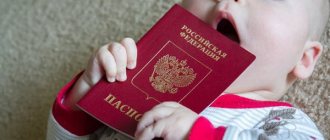Selling an apartment where parents and children live can be complicated by the need to obtain permission from the guardianship authorities. But this is required only if a minor citizen is listed among the owners of the residential premises. If he is simply registered, but does not have any property, the sale of the home or part of it will be simple. How to sell a share if a minor is registered?
The child has a share in the apartment
Most often this happens when parents fulfill their obligations to provide their children with square meters. The need for such actions is provided for by the legislation on maternity capital.
Funds are allocated to the entire family, which is why it is required that each family member receive their due portion of the living space. Selling the entire apartment or only a share in it is possible provided that the parents have a resolution from the local guardianship authority.
If, in exchange for the alienated share or apartment, the child is provided with some other residential premises, then there are no obstacles in obtaining the appropriate permission.
Sellers of a share in an apartment should keep in mind that permission will have to be obtained even when not only the share of the child himself is sold, but also that of another co-owner. This is directly related to the legal requirement to comply with the right of first refusal. Before selling a share, the seller must offer all owners to buy it for a certain amount of money.
Consequently, the child, being the owner, through his legal representatives can exercise this right. The waiver of the right to purchase the share being sold will have to be agreed upon with the guardianship authorities.
The child is registered in the apartment
Another situation, no longer related to the existence of ownership rights to a share. It does not imply obtaining consent to the transaction from an authorized body. Here, the issue of selling housing, in particular shares, is decided exclusively by its owner.
As a rule, all sellers wish to buy a home free of any rights, including the right of residence, that registration provides. Therefore, the main condition for the transaction is to deregister everyone who lives in the apartment.
Deregistration of a minor citizen is carried out with the consent of his parents. Both of them are considered his legal representatives, so the presence of the father and mother is usually required at the passport office. Written consent is also suitable if one of them is unable to appear in person.
To remove a child from an apartment, you do not need to contact the guardianship authority, since the solution to this issue is not within their competence.
Children's right to own real estate
Children's rights to real estate are under special protection of the state, therefore any transactions with their property require approval from the guardianship and trusteeship authorities. For conscientious parents this will not be a problem.
A minor child may be moved into an apartment or house without the consent of the tenant, the owner of the home, and registered citizens. Legal norms regarding the area required per person in a residential building may not be observed when a child moves in.
A child of any age can be the owner of shares in apartments and houses. Until the age of 14, the rights and obligations of a minor related to the ownership of real estate are assigned to his parents or guardians.
A child over 14 years of age can independently manage their own housing. However, under 18 years of age, the consent of his legal representatives will be required to exercise this right. A child becomes the full owner of a share in an apartment and other real estate after reaching 18 years of age.
A child who has reached the age of 16 can receive the same rights if they acquire full legal capacity. To do this, the child must:
- Get married. Divorce before age 18 does not deprive a child of full legal capacity.
- Get a job under an employment contract.
- Officially engage in business activities.
The last 2 cases of a child acquiring full legal capacity are called emancipation.
Emancipation is carried out by decision of the guardianship authorities with the consent of the legal guardians or by a court decision if they are against. Having received full legal capacity, the child can dispose of property, including shares in an apartment, without anyone’s consent, unless other rules are established by law.
When registering a share in an apartment for a child, as well as other actions with the real estate of a minor, the consent of the guardianship and trusteeship authorities is required. This consent will not be given if the child’s living conditions worsen or his share in the new apartment decreases. Sometimes a ban from guardianship authorities on conducting a transaction leads to difficulties in improving the child’s living conditions.
For example: parents, having a house in a remote village, want to sell it and buy an apartment in the capital, while the housing area per child’s share decreases. Formally, his living conditions are deteriorating, which means the deal will not be approved. Each specific situation has its own characteristics: to find out how to solve the problem, seek help from lawyers.
How to sell a share if a minor is registered?
The transaction procedure usually consists of several sequential steps:
- A written offer to the other co-owner.
- Search for a potential buyer.
- Discussion of conditions and fixing them in the contract.
- Deregistration of all residents.
- Signing the purchase and sale agreement.
- State registration activities.
Before selling, in order to avoid possible litigation, it is necessary to coordinate the sale of the share with other owners. It is quite possible if among your apartment neighbors there is someone who agrees to purchase another share in the apartment. If yes, then the buyer search stage can be considered completed.
If other co-owners refused this opportunity and did not formalize their refusal in writing, then they will have to wait exactly a month. This time can be spent finding another buyer and discussing all the nuances of the future agreement.
There is no need to draw up a contract yourself. The fact is that transactions for the sale of shares in residential real estate require notarization. The notary charges a fee for his services, which includes, among other things, preparation, drafting and printing of documents.
Protection of the rights of minors by a notary when performing notarial acts
November 20 is the Day of Legal Assistance for Children in the Russian Federation.
The notary plays an important role in the protection and implementation of property rights and interests of minor citizens.
The notary protects the interests of the child by performing notarial acts. Notarial actions aimed at protecting the legal rights of a child include: certification of transactions, including transactions for the transfer into common shared ownership of family members of an apartment for the purchase of which maternal (family) capital was used; issuance of a certificate of inheritance in the name of a minor; proof of parental consent for the child to leave the Russian Federation; alimony agreement; agreement between parents on determining the child’s place of residence; written obligations of owners of real estate who acquired this property using maternity capital funds.
Transactions related to the disposal of real estate under guardianship conditions, as well as transactions for the alienation (sale, exchange, lease, etc.) of real estate owned by a minor are subject to mandatory notarization.
When certifying a transaction, the notary is obliged to find out whether the expression of will corresponds to the true will of the participants; check whether the transaction was made under the influence of violence, threats, delusion, or deception; whether there is a malicious agreement between the child’s representative on the other side; Was it committed due to difficult circumstances?
It is worth considering that the disposal of property belonging to a minor is possible only with the prior permission of the guardianship and trusteeship authorities, which contains the conditions for the transaction, compliance with which is verified by a notary and explains to the parties the consequences of non-compliance with such conditions.
Donating property on behalf of a minor is not permitted.
The main advantages of notarization of real estate transactions are reliability, security, and accelerated registration of the transfer of rights. From February 1, 2021, a notary will also be able to independently submit documents for registration, that is, the convenience of a “one-stop shop” will arise. Giving real estate transactions a mandatory notarial form contributes to preliminary control over the legality of the actions of participants in civil transactions and reduces the number of disputes in the courts.
Another means of protecting the rights of minors is the certification of an agreement on the payment of alimony.
The obligation for both parents to support their minor children is established by family law. An agreement on alimony must be drawn up in writing and certified by a notary.
When certifying an agreement on the payment of alimony, the notary must find out whether the agreement complies with the requirements of the Family Code of the Russian Federation. In particular, the amount of alimony paid under the agreement cannot be lower than the amount of alimony that children could receive when collecting alimony in court: for one child - one quarter, for two children - one third, for three or more children - half earnings and (or) other income of parents. The agreement must not violate the interests of the children. Otherwise, it may be declared invalid by the court.
The protection of the rights of the child is carried out by a notary and when registering the right of inheritance. In the case where the heir is a minor child, the notary explains to the child’s legal representatives and the child himself (if he is over 14 years old) the procedure for registering inheritance rights. The children of the testator are among the first-order heirs. In addition, children of the testator who were conceived during life but born within 300 days after his death can be called upon to inherit by law. Minor heirs may be grandchildren and great-grandchildren, nieces and nephews of the testator. They inherit by right of representation.
The rights of the child are also taken into account when registering inheritance rights by issuing a certificate of inheritance rights for an obligatory share in the inheritance. This right arises for minor children of the testator if the testator made a will not in favor of the minor. In this case, the minor, as a compulsory heir, inherits, regardless of the contents of the will, at least half of the share that would be due to him if he inherited by law.
The Federal Law “On Additional Measures of State Support for Families with Children” (hereinafter referred to as the Law) establishes a list of additional measures of state support for families with children. According to the Law, residential premises acquired using maternal (family) capital are registered as the common shared property of parents and children, with the size of shares determined by agreement. Shares in the right of common ownership of residential premises acquired using maternal (family) capital are determined based on the equality of shares of parents and children in maternal (family) capital, and not on all funds from which the residential premises were purchased. Thus, the shares of parents and children in the ownership of residential premises acquired exclusively from maternal (family) capital are equal. If the residential premises are acquired only into the ownership of adult family members, then they give a notarized obligation to distribute in the future to the common shared ownership of all family members. The agreement on determining shares in residential premises acquired at the expense of MSK is also subject to notarization. If such an agreement is not concluded and notarized, it will be impossible to alienate such a property in the future.
Consent to travel abroad is also notarized. When a child goes abroad with one of the parents, the notarized consent of the second parent for the child’s departure according to the laws of the Russian Federation is not required. However, the need for notarial consent may be provided for by the laws of the country to which the minor is traveling. In addition, such documents are usually required when obtaining a visa. If a person under the age of 18 leaves the Russian Federation without parents at all, then he must have with him a notarized consent for the child to leave unaccompanied by parents.
The consent must indicate the period for which the departure is expected, as well as the countries that the child will visit. It should be borne in mind that the member states of the Schengen Agreement, as well as the USA, Canada and the UK, in any case require permission from both parents. Some carrier companies have their own specifics and rules for the passage of unaccompanied minors, which should be clarified in advance. If an unaccompanied minor child travels, parents need to clarify at the ticket issuance stage whether there is a need to order a service for transporting the child. The rules for transporting children (for example, the minimum age of the child) are established by each carrier in individual rules, which you must read in advance and pay for this service to the carrier.
When performing notarial acts, a notary provides qualified legal assistance to persons who apply to him and is obliged to ensure the protection of their property interests, including the rights of minors. The notary plays an important role in the protection and implementation of property rights and interests of minor citizens.
ELENA TOSHCHAKOVA
, NOTARY OF THE NOTARIAL DISTRICT OF KOMSOMOLSK-ON-AMUR, KHABAROVSK REGION
Source of publication: information monthly “The Right Decision” issue No. 11 (193) release date of November 26, 2018.
The article was posted on the basis of an agreement dated October 20, 2016, concluded with the founder and publisher of the information monthly “Vernoe Reshenie” LLC “.
What documents will be needed?
If among the owners of the apartment there are children or people under guardianship, you must take care in advance to obtain the appropriate permission from the competent authority. If these persons are only registered in the apartment, permission will not be required.
If the apartment share was acquired during marriage, care should be taken to obtain the notarized consent of the husband or wife.
The main document is an agreement that will be prepared and certified by a notary. Usually no other documents are required. Documents confirming ownership are also unnecessary. Currently, these documents can be requested through interdepartmental cooperation. In other words, when registering a transaction, the notary will simply request all the necessary information from Rosreestr.
Finally, another mandatory document will be a postal notice proving the fact that an offer to sell has been sent to other owners. It will not be required if you have written refusals from other homeowners.
conclusions
How to sell a share if a minor is registered? Registration, as is known, does not give the right to claim property. Therefore, if the child is simply registered in the apartment, the parents do not need to obtain permission from the guardianship.
The situation is different if the owner is a minor child. Here the parents need to run around, collect the necessary papers and convince the employees of the guardianship authority that the transaction in no way violates the rights of a minor Russian. If permission is received, we can consider that half the job is done.
Further actions are to prepare the property for sale, remove all residents from registration and conclude an agreement with the buyer. Since only a share is being sold, such an agreement will be drawn up by a notary. After it, you no longer need to go to Rosreestr, since the notary will personally send there all the documents relating to the transaction.
Rate this post
Under what conditions can you sell an apartment if children are registered there?
The law allows this type of transaction, provided that the minor has a place to be discharged.
The buyer should find out in advance whether alternative housing is available that complies with legal requirements. It should be taken into account that :
- In accordance with paragraph 2 of Article 20 of the Civil Code of the Russian Federation, a minor who has not reached 14 years of age must be registered at the same address where his mother and father are registered (if the parents live separately, then at the place of residence of one of them), or guardians.
- Children over 14 years of age can live at a different address, for example, with relatives. The procedure for extracting and the package of documents differ somewhat depending on whether the minor is the owner of the property being sold or is only registered in the premises.
Having a problem? Contact us!
How to make sure that a minor does not have property rights?
To gain confidence that a person under 18 years of age has the exclusive right to use the living space, you can do the following::
- Request an extract from the unified state real estate register indicating all owners, including those under the age of majority.
- Draw up an extract from the house register or a Unified Housing Document.
If it turns out that the minor is not only not indicated as the owner, but is also not registered in the real estate being sold, then he will not have anything to do with the transaction.
Sale of an apartment with a registered child and guardianship authorities
Purchasing an apartment with registered minor children may be complicated by the requirement to obtain permission from the authorities if the child is recognized as the owner of the living space or part of it. In this situation, the minor becomes a party to the transaction, so the Authorities monitor the observance of his interests in property terms. If the minor is only registered in the premises, the participation of the Guardianship Authorities is not required.
However, there is an exception to this rule: if a minor is under guardianship, for example, due to the absence of parents, then, even if he does not have property rights, the participation of the Authorities is mandatory.
Purchasing a privatized apartment with registered children
When purchasing an apartment with registered minor children, you should pay attention to the document that became the basis for the emergence of ownership rights.
If the basis is a privatization agreement, then it must be taken into account that when transferring premises from municipal property to private ownership, everyone registered in the apartment is the owner. In this case, adults can provide a waiver of participation in privatization, while children acquire ownership rights automatically. If you intend to purchase a privatized apartment, you need to request an extract from the house register from the archives and check whether children were registered in this premises on the day of its privatization. If minors were registered, but were not on the list of owners, then the rules for privatizing an apartment with minor children were not followed, and there was a violation of the law. An older child can go to court with a demand to restore his rights violated in childhood.
If children were registered after the end of privatization, then they have the exclusive right to use square meters. Such premises can be purchased without permission from the Guardianship Authorities.









